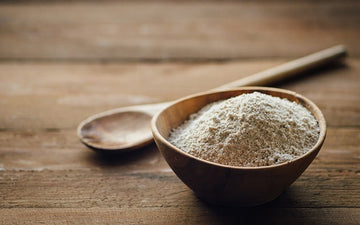
Pea protein powder, made by extracting protein from yellow peas, provides high-quality, plant-based protein, that can improve our overall health, as well as support our muscle growth and recovery (1, 2). It is rich in essential amino acids, particularly lysine (2, 3). Lysine plays a major role in calcium absorption, building muscle protein, recovering from injuries and the body’s production of hormones, enzymes and antibodies (4). Pea protein is an excellent source of branched-chain amino acids (BCAAs), that build muscles and stimulate protein synthesis promoting muscle growth (5). Hence, its use in plant-based protein powders.
Nutritional value
Pea protein has a brilliant nutritional profile, providing protein, fibre, vitamins and minerals (6). It contains the minerals potassium, magnesium, calcium and the vitamin folate (7). Recently, research has found that pea protein improved iron levels in female athletes, leading to improved health and performance (8).

Digestibility
Digestibility is not a fixed attribute of food but an interaction between the food and the person eating it, so there will be variation. Research has found pea protein and whey protein have similar digestibility factors (9). Whey protein contains lactose, a common food sensitivity, whilst pea protein is suitable for individuals with a range of dietary requirements due to being easily digested, hypoallergenic, vegan and gluten-free.
Health benefits
Pea protein has a beneficial impact on our gut microbiota by increasing beneficial probiotic bacteria, that helps to absorb nutrients, prevent inflammation and protect us from diseases. It also reduces harmful bacteria (10). Research has found pea protein to lower blood pressure (11). Also, yellow peas have a low glycaemic index and are high in protein and fibre meaning they are satiating, so it is effective at regulating food intake (satiety) and blood sugar levels (12).
Exercise effectiveness
Research has found pea protein powder to be as effective as whey protein powder when it comes to strength performance, body composition and muscular adaptation (13, 14). Due to its antioxidant and anti-inflammatory properties, it aids recovery (15).
Sustainability
Consuming pea protein is sustainable in the long-term and it is estimated that the production of pea protein is 4x to 7x less greenhouse gas-emitting than milk protein.
Sources:
- https://ift.onlinelibrary.wiley.com/doi/abs/10.1111/1541-4337.12573
- https://www.ncbi.nlm.nih.gov/pmc/articles/PMC6245118/
- https://www.sciencedirect.com/science/article/abs/pii/S0924224421001473
- https://www.researchgate.net/profile/Dowlathabad-Rao/publication/267817166_Medicinal_Uses_of_L-Lysine_Past_and_Future/links/56e13ff908ae979addf10b6b/Medicinal-Uses-of-L-Lysine-Past-and-Future.pdf
- https://college.agrilife.org/talcottlab/wp-content/uploads/sites/108/2020/01/Protein-1.pdf
- https://www.sciencedirect.com/science/article/abs/pii/S2214799322001461
- https://www.cambridge.org/core/services/aop-cambridge-core/content/view/1C97E78717EF51A80A80D4E09A233AE8/S0007114512000852a.pdf/div-class-title-review-of-the-health-benefits-of-peas-span-class-italic-pisum-sativum-span-l-div.pdf
- https://assets.researchsquare.com/files/rs-2145800/v1/189d5442-6da0-42dd-9bd9-d4d9af0e5a0f.pdf?c=1666627241
- https://ifst.onlinelibrary.wiley.com/doi/abs/10.1111/ijfs.14170
- https://www.frontiersin.org/articles/10.3389/fnut.2019.00047/full
- https://journal.lib.uoguelph.ca/index.php/surg/article/view/6111/5914
- https://www.cambridge.org/core/journals/british-journal-of-nutrition/article/effect-of-yellow-pea-protein-and-fibre-on-shortterm-food-intake-subjective-appetite-and-glycaemic-response-in-healthy-young-men/EE7D8B806761B876F5792192BB6C7874
- https://www.ncbi.nlm.nih.gov/pmc/articles/PMC6358922/
- https://www.tandfonline.com/doi/pdf/10.1186/s12970-014-0064-5
- https://pubmed.ncbi.nlm.nih.gov/21442413/





